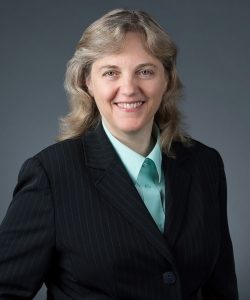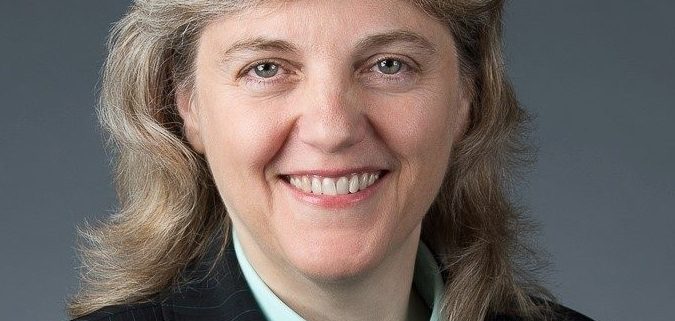Spotlight on Flex – Sharon Newlon
Our Spotlight on Flex showcases professionals from member organizations who exemplify personal and professional success while working a flexible schedule. Their stories illustrate the long-term benefits that flexible schedules offer to both individuals and organizations.
2019 Spotlights
For July 2019, we are pleased to share insights from Sharon Newlon, Member and Environmental, Energy & Sustainability Practice Group Co-Chair, Dickinson Wright (Detroit, MI)
Diversity & Flexibility Alliance: How have you made flexibility a priority and a success with your career? How has the firm supported this?
 Sharon Newlon: I had always looked for a career that could meld my interest in math, science, and the law. By the time I was in law school, I knew I wanted to focus on environmental law since this mixed all my interests into one area. I was introduced to Dickinson Wright when I was hired after my first year of law school as a research associate for a bankruptcy attorney here who was writing a book for Matthew Bender. Dickinson didn’t hire first year interns for its summer program at the time, but I was introduced to the head of their environmental practice and invited back for my second year summer in 1987. I expressed my interest in environmental law and was assigned great projects in that area – and I’ve been with the firm ever since!
Sharon Newlon: I had always looked for a career that could meld my interest in math, science, and the law. By the time I was in law school, I knew I wanted to focus on environmental law since this mixed all my interests into one area. I was introduced to Dickinson Wright when I was hired after my first year of law school as a research associate for a bankruptcy attorney here who was writing a book for Matthew Bender. Dickinson didn’t hire first year interns for its summer program at the time, but I was introduced to the head of their environmental practice and invited back for my second year summer in 1987. I expressed my interest in environmental law and was assigned great projects in that area – and I’ve been with the firm ever since!
I’ve had different career opportunities over the years, but I was, and am, really happy at the firm and with the environmental group. When my son was born in 1998, flex/reduced hours were already in place for associates, but not members. Dickinson saw how well flex was working at the associate level, and they expanded the reduced hours policy to income members while I was on maternity leave. I came back from leave, at full time for a month, but found it was hard to manage expectations both as a new parent at home and at work. With the new reduced hours policy for members in place, I switched to a 75% reduced hours schedule.
I started by working 3-1/2 days per week at the office, while our son was in part-time daycare. Flexibility was a key consideration, and after receiving recommendations for day care programs, we selected one that could keep our son for a full day, if needed. Fortunately, we were able to limit that to a handful of times. Once my son entered elementary school, I would come into the office every day during the academic year, but I would leave by noon two days a week. Once my son was in high school, I kept the same reduced hours but was able to take on more work and be out of the office for one day. I feel like my flex schedule and the firm’s flex initiatives have adapted together as my son has gotten older (now he’s in college).
Dickinson doesn’t currently have a program for reduced hours for equity members. However, they do have a consulting member tier with a negotiable billable hour requirement and some profit sharing abilities. As it was originally established to help transition equity members moving into retirement, only equity members could progress to this tier. When I was coming up the ranks, a female associate told me, “People are watching you and want to see how you’re going to address this issue.” I was an income member at the time, and hearing this made me realize I could do something that would pay it forward for younger members and associates at the firm. I asked our CEO if I could change my status to a consulting member; I highlighted how allowing income members to also progress to the consulting tier was a win/win for the firm. If I did better, then so did Dickinson. I, and others, would be incentivized to stay and excel. After some further campaigning, the governing board changed the partnership agreement, and now income and equity members have an opportunity to move to consulting member status.
As a consulting member, I still keep a reduced hours schedule but with profit sharing when I exceed my base numbers. The biggest win, from my perspective, is it sends a signal to people working their way up that there are options. You are not lock-stepped into only income or equity status. This whole process showed me I’m more control of my career than I thought. And it’s showing others how to take ownership of their careers while providing value to clients and the firm.
DFA: How has working flexibly made your career more sustainable and contributed to your overall internal and external development? How have clients supported your flex journey?
SN: Some clients know about my schedule, and those that do are very supportive of it. They appreciate knowing when I’m off so they can respect my hours; I’m responsive to their needs, and they respect that.
If you think you’re going to be able split your time as 50% mom and 50% attorney, it’s not going to work. There are going to be days when you feel like you’re the worst attorney and mom, and there are going to be days when feel like you’re the best attorney and mom in the world! My flex success has been my ability to focus on work priorities and still eat dinner with my family every night. If I get behind in hours, I have room in my schedule to make up for them later.
I was overwhelmed as a new parent when I returned to work, and I don’t know if I would have been able to sustain a full time practice as well as happy, healthy family life without flex. Flex and reduced hours made it possible to stay and flourish. Dickinson has been extremely supportive of the policies in place and of my needs over the years. Two years ago my husband had an extended illness that required constant care during his recovery. I worked remotely for six weeks to be with him, and the firm immediately set up the technology I needed in my home office to make work operations seamless.
My reduced hours schedule also allows me to focus on internal development and firm citizenship. I was on the associate’s committee for three years, and I am co-chair of Dickinson’s environmental practice group. I’ve been able to fully commit to those responsibilities on top of my external business development. When you have flexibility, you have time to focus on many things – I can take a day to network with other women in environmental science, to actively participate in professional organizations, and still perform at work. It’s so important to build time for these development opportunities into your schedule – flex allows for that to happen.
DFA: Looking back, what would you tell your first year associate self?
SN: In addition to developing a good understanding of the business of our work, I would make sure I understood there are options, and taking ownership of my career means exploring and expanding those options. I don’t know how hard I would’ve pushed for consulting member status had I not been reminded that others were watching how I would navigate my career trajectory. I was empowered and nervous at the same time, but I did it to create a sustainable career for me and others at the firm. I had shoulders to stand on as I was making my way, and I believe you should do things that can make it better for others behind you too.
DFA: What do you do to recharge? How do you pay it forward?
SN: I’ve been singing longer than I’ve been practicing law, and when I’m singing, I’m in my happy place – in fact, I met my husband because of it! I sing at our church where my husband is the Minister of Music. We take family vacations, and with my reduced hours, I can plan accordingly. Just like you need to build in time for business development, you need to build in time to relax.
I informally mentor younger associates about how I “make it work” with flex, and I openly participate in firm initiatives and panels to highlight our flex policies. I present every year at a program for high school girls showcasing careers in math and science sponsored by the Cranbrook Institute of Science and the American Association of University Women. I serve on the alumni board of the College of Engineering and Science at my undergraduate alma mater, University of Detroit Mercy, and I support students from my law school, Notre Dame, by participating in mock interviews. I look forward to seeing how these future leaders will adapt to and with the workplace.

